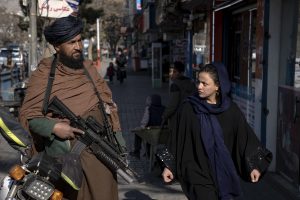Baktash Siawash

On Saturday, the Taliban banned women from working with nongovernmental organizations (NGOs) in Afghanistan. The ban comes days after the Taliban indefinitely banned women from universities.
These restrictions add to the growing list of impositions by the Taliban on Afghan women. Since its takeover in August 2021, the group has barred girls from secondary schools, women from most of the workforce, women and girls from participating in sports, and women from traveling without a male chaperone. Further, the Taliban have dismantled domestic abuse shelters, created barriers for women and girls to access health care, and arrested and tortured female protesters demanding their basic rights, among a litany of other abuses. In its recent report, Amnesty International referred to the Taliban’s policies against women as “death in slow motion.”
Afghan women are being erased from society in Taliban-run Afghanistan.
As the Taliban have not lived up to its international obligations, countries must take measures beyond condemnation, such as avoiding bilateral meetings with the Taliban (since their return to power, the group has had at least 440 engagements with foreign countries) and ensuring all interaction is limited within the purview of the United Nations to tackle the country’s humanitarian crisis, conditioning economic assistance, placing travel ban restrictions on group leaders, and freezing their personal bank accounts to raise the costs of denying Afghan women their rights.
The latest directive not only affects women but also Afghans who rely on the support of NGOs for survival.
The humanitarian situation in Afghanistan is dire, ranking as the second most severe in the world behind East Africa. According to the International Rescue Committee (IRC), “Ninety-seven percent of Afghanistan’s population is at risk of poverty, with over half of Afghans reliant on humanitarian aid. Already, 91% of the average Afghan household’s money is spent on food, forcing many families to resort to rationing and other coping strategies.” This winter, approximately 18.9 million Afghans are experiencing food insecurity, according to the IRC.
Due to the newest restriction on NGOs, the following day, on December 25, Save the Children, the International Rescue Committee, the Norwegian Refugee Council, Islamic Relief, and CARE suspended their operations in Afghanistan as they are unable to continue providing their services without female employees. These NGOs have been providing critical services amid the dire humanitarian crisis in the country, such as nutrition and healthcare, and their suspension puts Afghans who depended on them at risk.
While the ban harms Afghans, it also damages the Taliban’s prospect of international recognition as the group alienates itself from international organizations.
But the latest ban makes it apparent that the Taliban are not interested in international recognition. Such recognition is deemed too costly to the integrity of the Taliban — a deeply misogynistic group. The pathway to recognition would require the group to forgo its most extreme ideology, thereby undermining core Taliban values and further causing rifts within the Taliban.
Reports have emerged that the Taliban is fractured internally among moderates and hardliners. According to the Associated Press, “The Taliban have been divided between pragmatists and hardliners, as they struggle to transition from an insurgency to a governing body. Meanwhile, their government has been dealing with a worsening economic crisis. And Taliban efforts to win recognition and aid from Western nations have floundered, largely because they have not formed a more representative government, and restricted the rights of girls and women.”
Above international recognition and mitigating the humanitarian crisis, the group has been prioritizing internal unity — at the cost of harming Afghans. And suppressing women’s rights has been the rallying banner to unite the Taliban, as through these restrictions, the group appeals to its most extreme members, its hardliners.
While foreign capitals have called on the Taliban to reverse their latest ban, with each passing day of Taliban rule, the group makes it evident that systematic repression against women is regime policy.
No comments:
Post a Comment